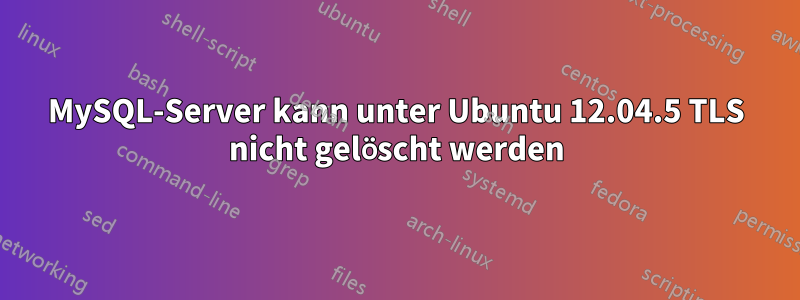
Ich versuche, MySQL-Server 5.6 neu zu installieren, kann aber nichts tun und erhalte jedes Mal diese seltsame Meldung:
root@ps****:/home/nikitasorokin# apt-get remove --purge mysql-server-5.6
Reading package lists... Done
Building dependency tree
Reading state information... Done
The following package was automatically installed and is no longer required:
mysql-client-core-5.6
Use 'apt-get autoremove' to remove it.
The following packages will be REMOVED:
mysql-server-5.6*
0 upgraded, 0 newly installed, 1 to remove and 941 not upgraded.
1 not fully installed or removed.
After this operation, 52.5 MB disk space will be freed.
Do you want to continue? [Y/n] y
(Reading database ... 122623 files and directories currently installed.)
Removing mysql-server-5.6 (5.6.25-0ubuntu1) ...
stop: Unknown instance:
invoke-rc.d: initscript mysql, action "stop" failed.
dpkg: error processing package mysql-server-5.6 (--purge):
subprocess installed pre-removal script returned error exit status 1
stop: Unknown instance:
invoke-rc.d: initscript mysql, action "stop" failed.
start: Job failed to start
invoke-rc.d: initscript mysql, action "start" failed.
dpkg: error while cleaning up:
subprocess installed post-installation script returned error exit status 1
Errors were encountered while processing:
mysql-server-5.6
E: Sub-process /usr/bin/dpkg returned an error code (1)
Ich weiß, dass die wichtigste Empfehlung darin besteht, MySQL und alle seine Komponenten vollständig zu deinstallieren, aber das kann ich nicht. Können Sie sich bitte eine Lösung vorstellen?
Antwort1
Bearbeiten des
post-installationSkriptssudo nano /var/lib/dpkg/info/mysql-server-5.6.postinstSuche die Funktion
invoke() { if [ -x /usr/sbin/invoke-rc.d ]; then invoke-rc.d mysql $1 else /etc/init.d/mysql $1 fi }und ersetzen durch
invoke() { echo #if [ -x /usr/sbin/invoke-rc.d ]; then # invoke-rc.d mysql $1 #else # /etc/init.d/mysql $1 #fi }Speicher die Datei
Bearbeiten des
pre-removalSkriptssudo nano /var/lib/dpkg/info/mysql-server-5.6.prermSuche die Zeilen
if [ -x "/etc/init.d/mysql" ] || [ -e "/etc/init/mysql.conf" ]; then invoke-rc.d mysql stop || exit $? fiund ersetzen
if [ -x "/etc/init.d/mysql" ] || [ -e "/etc/init/mysql.conf" ]; then echo #invoke-rc.d mysql stop || exit $? fiBearbeiten des
post-removalSkriptssudo nano /var/lib/dpkg/info/mysql-server-5.6.postrmSuchen
# New packaging paradigm for my.cnf as of Dec-2014 for sharing mysql # variants in Ubuntu. case "$1" in remove|disappear) /usr/share/mysql-common/configure-symlinks remove mysql "$mysql_cfgdir/mysql.cnf" ;; esacund ersetzen
# New packaging paradigm for my.cnf as of Dec-2014 for sharing mysql # variants in Ubuntu. case "$1" in remove|disappear) # /usr/share/mysql-common/configure-symlinks remove mysql "$mysql_cfgdir/mysql.cnf" ;; esacSpeichern Sie die Datei und führen Sie den Befehl erneut aus
sudo apt-get remove --purge mysql-server-5.6


